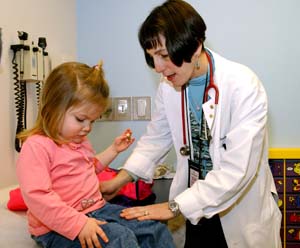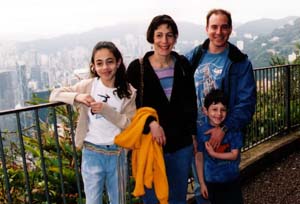Sometimes, the innocence of youth is captured in a moment; other times, in a place. For Abby S. Hollander, M.D., associate professor of pediatrics, that place was — and is — summer camp.
While growing up, Hollander spent many summers as a camper and counselor at Camp New Moon, tucked among pine trees in the Muskoka region of Ontario. There she discovered the value of making friends, learning life skills, exploring nature and feeling a strong sense of camaraderie.

Now, as part of her involvement with the local chapter of the American Diabetes Association, she has served as a camp doctor at the St. Louis-area diabetes camp since 1990, and became medical director three years ago. And she thinks camp serves a special purpose in children with diabetes.
“The main benefit of camp is how much it can build self-confidence,” Hollander says. “Many of these kids are given much less freedom at home compared to siblings and friends, and they can start to doubt whether they can ever be away from their parents like ‘normal’ kids.”
In treating children with diabetes for almost 20 years, Hollander has discovered that teaching these kids to be responsible for their own diabetes care is the greatest determinant of their future success and health.
“Unfortunately, diabetes is a very demanding disease — it’s all day, every day. And there’s a lot of responsibility put on the patient,” Hollander says. “But the patients who truly believe that they can make a difference for themselves are the ones who are going to do the best.”
Treating the whole patient is one of the attributes that make Hollander an exceptional physician, says Louis Muglia, M.D., Ph.D., associate professor of pediatrics and of molecular biology and pharmacology, and division director of pediatric endocrinology and diabetes.
“She is very knowledgeable about what brings her patients in for medical care, but also about other aspects of their lives that impact how they manage their disease,” he says. “The detail that she knows about all of her patients is amazing — what disease they have, their brothers and sisters, where they go to school and what their hobbies are.”
Hollander grew up in Cleveland with a sister and two brothers who all participated in numerous sports and extracurricular activities. Family vacations included trips to Florida, the Virgin Islands and Puerto Rico. At night on vacation, the family played poker — for peanuts.
“My dad never liked to gamble for money, but peanuts were OK,” Hollander says.
Hollander, a biochemistry major at Cornell University in the early ’80s, decided during her junior year that she wanted a career in medicine. She chose pediatrics during her third year of medical school, although her father, an ophthalmologist, tried to convince her otherwise.
He said, “You do whatever you want, but all of my friends who are pediatricians tell me they wish they’d become ophthalmologists.”

During her pediatrics rotation in her third year of medical school at the University of Cincinnati, she spent some time in endocrine clinics. And during a full-day seminar on recombinant growth hormone, she knew she wanted to become a pediatric endocrinologist.
“Intellectually, the specialty was very interesting,” Hollander says. “It also seemed logical to me; ‘Here’s where the problem is, here’s how we fix it,’ and the solutions seemed to make sense.”
Pediatric endocrinologist Larry Dolan, M.D., who seemed to greatly enjoy seeing patients and always took his time and allowed them to ask lots of questions, inspired her.
After completing a residency at Children’s Memorial Hospital in Chicago and a pediatric endocrinology and diabetes fellowship at St. Louis Children’s Hospital and the School of Medicine, she joined the Washington University faculty in 1992.
About half of Hollander’s patients have diabetes, and one of her special challenges is treating teenagers with the disease.
“I just admit up front that it’s not fair and you’re not supposed to like it,” she says with a smile. “The tough issue for them is equating their day-to-day diabetes care with how their body is going to be in 20 years.”
The other half of Hollander’s patients has a wide variety of endocrine problems, ranging from hypothyroidism to hypochondroplasia to Turner’s syndrome.
In general, Hollander says in the past 10 years endocrinologists have gained a more specific understanding of genetic disorders and what’s responsible for poor growth.
But one of the biggest issues for pediatric endocrinologists today is treating the increasing number of overweight children.
“We end up reiterating what everyone else has told them,” she says. “We don’t have any magical answers. Eating habits as a whole need of lot of work across our society, obviously.”
|
Abby S. Hollander Title: Associate professor of pediatrics Arrived at University: 1992 Research observation: “Most men that I know who are under 6 feet tall would describe themselves as short, whereas 6 feet tall is in the 75th percentile for height.” |
Hollander’s clinical research addresses the molecular variants of growth hormone, the use of insulin pumps in children and complicated presentations of type-2 diabetes in adolescents.
She also studies new therapies in diabetes mellitus, growth hormone deficiency and hypothalamic obesity.
Hollander also serves as the medical director of pediatric ambulatory medicine and lectures first-year medical students in organs and systems biology and second-year medical students in the pathophysiology course.
“Abby is deeply invested in shaping the future of pediatrics and pediatric diabetes and endocrinology,” says Alan L. Schwartz, Ph.D., M.D., chair of the Department of Pediatrics and the Harriet B. Spoehrer Professor of Pediatrics.
“Not only is she an outstanding clinician, but she also is a terrific educator of medical students, residents, fellows and her faculty colleagues. Her quiet, consistent and thoughtful personality belies her keen administrative abilities, which she uses to oversee the entire ambulatory practice in pediatrics. ”
Additionally, Hollander is president of the Academic Women’s Network, which currently is supporting a policy to extend the tenure clock for people who have major life events related to childbirth, child adoption or a family illness.
“Abby holds many crucial leadership roles here at Washington University School of Medicine and St Louis Children’s Hospital,” says Kathleen McGann, M.D., an associate professor of pediatrics who has known Hollander since their residencies.
“It never ceases to amaze me how she does each well, and at the same time is able to balance her career and personal life.
“Not to mention that she and her husband throw a terrific annual Super Bowl party!”
Hollander and her husband, Craig Hollander, a local pediatric dentist, have two children, 10-year-old Jenny and 7-year-old Ian. Jenny and Ian are active in sports, gymnastics and drama, and the family enjoys swimming and traveling together.
Last year, they took a trip to Hong Kong and Thailand, where Hollander’s brother and his wife were living.
As medical director of the diabetes camp, Hollander spends a great deal of time during the year scheduling numerous physicians, residents and nurses to staff the 10-day camp and organizing all the donated medical supplies.
She also helps the organizers figure out ways for these children to do everything most campers do.
“If you’re going to stay in medicine a long time, you’re not going to be happy if you take yourself too seriously,” she says. “And we all have to realize there’s a lot of good that can come out of stuff that’s fun.”